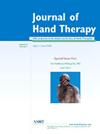澳大利亚手部治疗师的研究能力和文化:横断面调查
IF 2.1
4区 医学
Q2 ORTHOPEDICS
引用次数: 0
摘要
背景确定手部治疗实践中参与研究能力和文化(RCC)的影响因素,对于制定支持高质量研究及其在临床实践中实施的策略至关重要。本研究旨在测量澳大利亚手部治疗师的研究能力和文化,以确定与开展研究相关的感知障碍、动机和技能。研究设计横断面调查方法邀请澳大利亚手部治疗协会的所有成员完成研究能力和文化工具,该工具包括三个领域:i) 个人;ii) 专业团体(团队);iii) 组织。调查结果显示,澳大利亚手部治疗师在所有 RCC 领域的 RCC 水平都相对较低,在这些项目上的得分不是中等就是较低。本研究的结果表明,受访者感觉最有信心的领域或技能与循证从业人员所需的临床技能更为接近,而其他技能则与临床研究人员更为接近,如数据分析或撰写建议书。未来的支持策略应侧重于提高手部治疗师对常见研究任务的了解和信心,并为手部治疗师担任更多临床研究者角色提供资金和指导。本文章由计算机程序翻译,如有差异,请以英文原文为准。
Research capacity and culture among hand therapists in Australia: A cross-sectional survey
Background
Identifying the factors influencing engagement in research capacity and culture (RCC) in hand therapy practice is essential to inform strategies to support contributions to high-quality research and its implementation in clinical practice. However, the RCC of clinicians providing hand therapy services in Australia has not been investigated.
Purpose
This study aimed to measure RCC among hand therapists in Australia to identify perceived barriers, motivators, and skills related to undertaking research.
Study Design
Cross-sectional survey.
Methods
All Australian Hand Therapy Association members were invited to complete the RCC tool, which includes three domains: i) individual, ii) professional group (team), and iii) organization.
Results
One hundred twenty-two therapists (13.6% response rate) completed the survey. Survey findings indicate that the RCC of hand therapists in Australia is relatively low across all RCC domains, with scores on these items being either moderate or low. The findings from this study suggest that the areas or skills that respondents felt most confident with were more closely aligned to the clinical skills required as evidence-based practitioners, compared to other skills more closely aligned with the clinician-researchers, such as data analysis or writing proposals.
Conclusions
Hand therapists in Australia may not possess the research experience or skills required to confidently complete a range of research-related activities. Future support strategies should focus on improving hand therapist knowledge and confidence regarding common research tasks and provide funding and mentoring for additional hand therapist clinician-researcher roles.
求助全文
通过发布文献求助,成功后即可免费获取论文全文。
去求助
来源期刊

Journal of Hand Therapy
医学-外科
CiteScore
3.50
自引率
10.00%
发文量
65
审稿时长
19.2 weeks
期刊介绍:
The Journal of Hand Therapy is designed for hand therapists, occupational and physical therapists, and other hand specialists involved in the rehabilitation of disabling hand problems. The Journal functions as a source of education and information by publishing scientific and clinical articles. Regular features include original reports, clinical reviews, case studies, editorials, and book reviews.
 求助内容:
求助内容: 应助结果提醒方式:
应助结果提醒方式:


